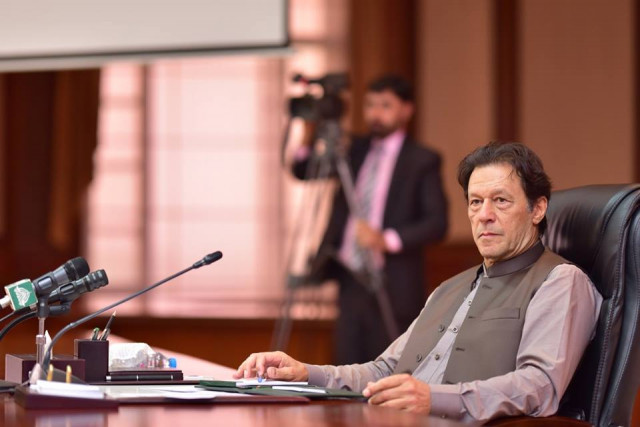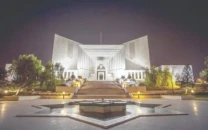PM Imran vows to uphold law in matter of judges
PM’s aide says law minister briefed cabinet about reasons behind filing references

PM Imran Khan. PHOTO: PID
“No one is above the law as the Pakistan Tehreek-e-Insaf (PTI) came to power on the election slogan of ‘not two, but one Pakistan’,” said Special Assistant to the Prime Minister on Information and Broadcasting Dr Firdous Ashiq Awan while quoting the prime minister as saying during the cabinet meeting on Monday.
Talking to the media post-cabinet meeting, Firdous said the law minister briefed the cabinet about the reasons behind filing references against the higher court judges.
The cabinet members were of the view that if any citizen in an institution violated the Constitution, the law would take its course, said the special assistant.
The PM’s aide said, “The government wants to change the rotten system. Imran Khan is the saviour of the nation and has the mandate to ensure the rule of law. It can never happen that the prime minister becomes part of the status quo and lets the system rot."
Firdous said Assets Recovery Unit head Shehzad Akbar had received a complaint about the assets of judges and after verification sent a summary to the prime minister, who forwarded it to the president for his approval.
The assets, she said, were verified by the land registry in the United Kingdom and the documents were endorsed by Pakistan High Commission there as well.
Prime Minister Imran had led the movement for the restoration of judiciary and even went to jail for it, she added.
"As the judiciary is looking into the complaint, it can't be considered an attack on judiciary."
Firdous said the government would accept the SJC's decision and condemned the opposition for, what she called, “shedding crocodile tears over the matter”.
The government had adopted the path given in the Constitution made by Zulfikar Ali Bhutto and did not deviate from it, she noted, adding that there could not be a sacred cow in any institution.
She said the PTI leadership would bring reforms in the institutions because of its honesty and sincerity.
On Minister of State for Climate Change Zartaj Gul’s bid to get her sister appointed in the National Counter Terrorism Authority (Nacta), Firdous said that PM Imran had expressed his displeasure with Gul during the cabinet meeting as when she raised her hand to talk, the PM told her that she should not have taken such a step.
The cabinet was briefed about the damages to the wheat crop caused by untimely rains and thunderstorms.
Due to heavy rains, about 1.3 million tonnes of wheat crop had been damaged. Despite the loss, the total wheat production this year would be 24.3 million tonnes, which along with last year's stocks of 3.7 million tonnes would be enough to meet the needs of the country.
The cabinet was told that during the tenure of the present government, farmers received good support price for the crops of rice, sugarcane and wheat.
The farmers sold their wheat stocks at the rate of Rs1,300 per maund and sugarcane at Rs180 per maund for the first time in the country's history.
The cabinet expressed its concerns over not yet staring the purchase of wheat in Sindh, while a big scandal in that regard had also surfaced in the province.
It was revealed that sand and stones were found in the sacks instead of wheat.
The cabinet was told that the matter was being investigated.
The federal government had increased the quota of Passco for the purchase of wheat in Sindh.
The cabinet was also informed that the federal government had approved the posting of Attique Ahmed as Federal Board of Intermediate and Secondary Education secretary.
It also approved the Cash Management and Treasury Single Account Policy 2019 with the aim to effectively manage the cash and loans of the government.
Till now there was no policy regarding cash held by the government and there was no method of proper invoicing.
After the cabinet's approval, trillions of rupees held by departments for getting interest would be available in the central pool and information about the cash flow of the government would be transparent and visible and could be shared with the public.
The report regarding implementation of this policy would be presented to the cabinet which in principle had approved the public finance management bill.
The cabinet approved that for one time the visas of Chinese experts and professionals working on the China-Pakistan Economic Corridor (CPEC) project would be changed from visit to work visas.
The aim of the relaxation was to facilitate the Chinese citizens so that the pace of work on the projects in Pakistan was not affected.
The cabinet instructed the Ministry of Planning that a policy should be formulated to ensure jobs for Pakistani workers and skilled labour force in different projects of CPEC.
The cabinet also waived the fine amounting to $450,000 on foreign students studying in Jamia Banuri.
The fines were imposed as the students overstayed on their expired visas. However, they did not have the money to pay the fine. The posting of Raja Jawad Abbas Hassan, District and Sessions Judge as judge Special Court (Anti-Terrorist-I) Islamabad was also approved.
The cabinet ratified the decisions taken in the meeting of the Economic Coordination Committee on May 30, 2019.
(With additional input from APP)



















COMMENTS
Comments are moderated and generally will be posted if they are on-topic and not abusive.
For more information, please see our Comments FAQ